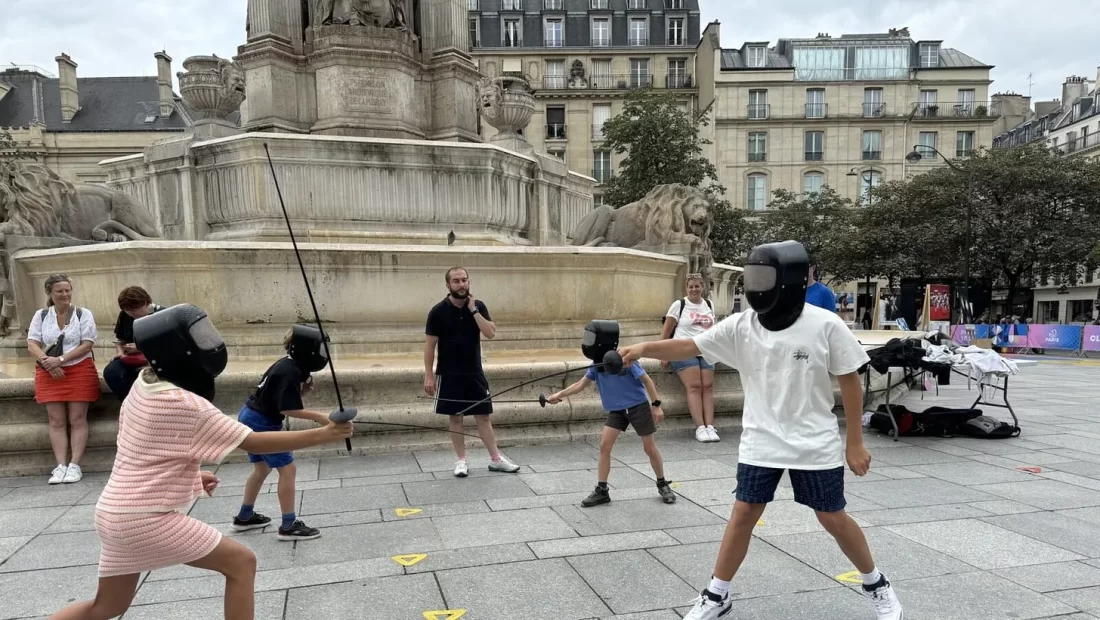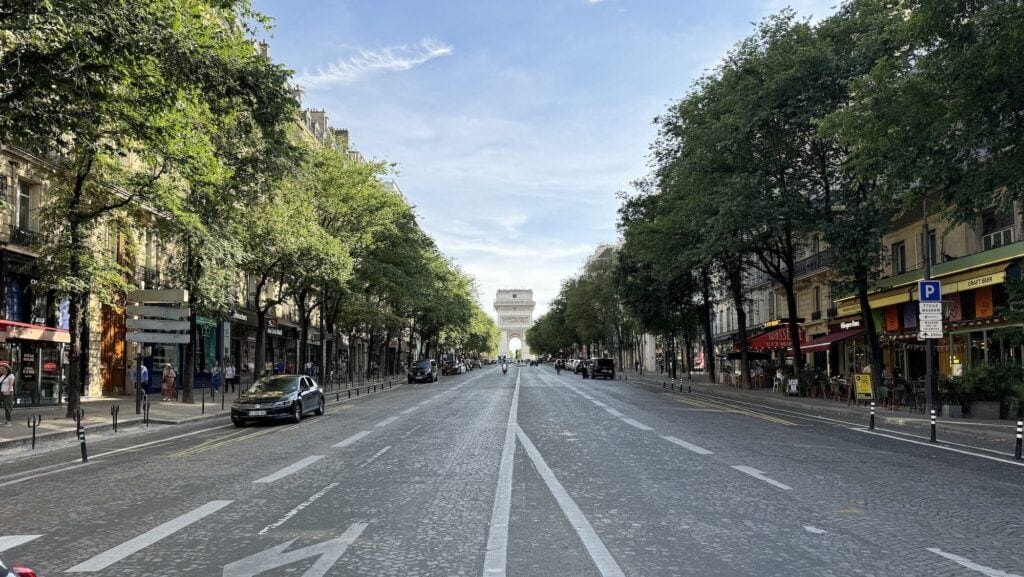
Here’s How Paris Surprised Me During the Olympics
I had no idea what Paris would be like during the Olympics and arrived with a mix of anticipation and dread. After a week of watching Olympic events and strolling the streets of Paris, here’s what’s surprised, dazzled, and inspired me about the city and the Games.

Paris has felt quiet.
Where is everybody? This was definitely not the question I was expecting to ask myself during the Games. A friend flew to Paris for the opening ceremony and the plane was so empty that all the economy passengers had the luxury of stretching out flat across the empty seats. Friends are reporting with glee that the hardest to get restaurant reservations are now easy. I am often the only customer in boutiques and stores. Traffic is restricted on some major thoroughfares, like the Boulevard Saint-Germain, where there’s not a private car or bus in sight, which only adds to experiencing Paris in a very different way. Crossing streets that aren’t traffic restricted is suddenly easy. Many shops and restaurants staffed up, and even stayed open during their normal August closures, to serve the Olympic crowds who haven’t materialized, impacting their businesses. But, as a visitor, it is delightful to visit a peaceful and uncrowded Paris with nearly empty sidewalks and plentiful seats on the metro.
August is the traditional vacation month for Paris, which partially explains empty streets, and many additional locals decided to leave town to avoid the potential hassles. More foreign visitors than expected also chose to stay away, to the extent that Delta Airlines is expecting a $100 million revenue loss due to the Paris Olympics, according to the CEO.
Despite these Games, according to the organizers, selling more tickets than any other Olympics, there are still tickets to be purchased for many events. There were 10 million tickets released for the Games ranging in price from €24 ($26; £20) to many hundreds of euros. And then there are the hospitality packages that add transportation, dining, champagne, and a great vantage point, but at a steep price. Want to see the men’s basketball final, which just might include some American superstars, in style? That will be €6,500 ($7,000; £5,500) per ticket for the hospitality package. Organizers have said that the prices are not more expensive than previous Games, but many people feel priced out and the events I have been to have had some empty seats.
The spectacles are truly spectacular.
Paris is doing one of the things that the French do best—spectacles, and they can be impressive to behold. The French have a long history of understanding the power of spectacle. In the summer of 1676, King Louis XIV ordered that hundreds of wildly expensive and exotic white swans—a completely new bird for France—to be imported and released in the Seine. One of the objectives was that visitors traveling by boat between Paris and the Palace of Versailles would pass by the impressive birds and be amazed by the wonder of the French court. It’s a flair that continues to thrive, and the French spirit of spectacle is everywhere during the Games.
At the conclusion of the opening ceremony, the Olympic Torch ended its long relay journey by lighting a giant caldron suspended by a hot air balloon that rose into the night sky. It floats aloft every evening at dusk until 2am, weather permitting, throughout the Games. The interesting thing is that the ring of “fire” in the cauldron is not actual fire but thousands of LED lights and water mist, which took three years to perfect, and looks exactly like the real thing—the first time the Olympic flame is not actually the flame—in the history of the games. The actual Olympic flame is a footnote enshrined near the balloon, in the Tuileries Gardens, where the first manned hot air balloon launched in 1783. I did find the crowds here—tens of thousands of people line the Seine every night hoping to watch the Olympic cauldron rise into the sky. The French guessed that a spectacle like this would be far more impressive and memorable than seeing the actual Olympic torch. And given the excitement on the streets, it’s clear they were right.
This sensibility carries throughout the Games, from the famous (or infamous) opening ceremony to the event venues which were chosen with care for their magnificent settings—fencing in the soaring glass enclosure of the Grand Palais, skateboarding in the Place de la Concorde, equestrian events (I went to one!) in front of the Palace of Versailles, and beach volleyball under the Eiffel Tower, to name a few.
There’s an army of volunteers, and the Army.
There are 45,000 helpful volunteers all over Paris. Every metro stop has a squad of helpers, and each event has hundreds shepherding attendees to and from the venue. They are also present all over Paris in the streets. The easily identified volunteers, wearing bright purple vests, answer questions (in several different languages), hand out water and fans, and generally cheer people on.
The walk from the busses to the equestrian events at Versailles was about a half mile long and lined by enthusiastic volunteers wishing us a good day, playing music, encouraging dancing, and joking with the crowd. Special play areas for kids have been set up all over the city to let children try their hands at different sports. I watched several rounds of tiny fencers, complete with helmets and protective gear with sensors, being instructed by a fencing volunteer about the basics of the sport. Nearby was a three-foot-high basketball hoop, a ping-pong table, and uneven bars over a sea of mats.
France has had a sad history with terrorism, and safety at the Games is being taken very seriously. The presence of police, security, and army is unmissable at the venues and all through the city. Well-armed patrol units of the army are walking through neighborhood streets, making sure all is safe. Security is tight to enter any of the venues with bag checks and metal detectors. I might have imagined that this would feel oppressive, but, for me, it makes the Games feel more secure.
The details matter.

The level of thought and care that has gone into the logistics of the Games is amazing to see. There are event locations all over the city, and it can feel complicated for newcomers to the transport system to get around. Organizers have taken great care that it is easy to find venues. The standard chart of stops over the door of every metro car has been replaced with new ones that indicate the stops for the venues—all in the recognizable shade of Olympic pink used by these games.
Once you exit the metro car there are signs at every turn indicating the way to the place you need to get. I attended a field hockey match at a stadium slightly outside of town, which was a 15-minute walk from the train station through the streets of a suburb with several turns. This could have been complicated if it weren’t for the volunteers and the convenient pink stripe painted in the middle of the street to indicate the way.
If a bus is needed to ferry people from a station to an event that is slightly further away, it is seamless and organized. Even with an event of tens of thousands of people all leaving at the same time there was only a brief wait for a bus and very clear instructions to the busses and their destinations.
And yes, it is green.
I’ve visited many cities that have hulking buildings outside of the center, often moldering and choked with weeds, which were constructed to host prior Olympic events. Paris has gotten mixed reviews for choosing not to install air conditioning in the Olympic Village and providing cardboard beds with inflatable mattresses for the athletes, but hasn’t built any new structures to house the hundreds of different games. They’ve smartly used existing sports facilities, sometimes dramatically repurposing them, like building a temporary pool over a rugby field in a huge stadium to host swimming events. The beautiful equestrian venue was entirely temporary—the portable bleachers will come down at the end of the Games and the field will once again be grass.
It really is the world’s games.
My biggest takeaway from spending a week in Paris during the Olympics is the breathtaking array of nations, events, and languages around every turn. Walking down the street it’s easy to hear dozens of different languages and see fans carrying such a range of flags that it would challenge a geography student to identify them all.
Certain countries are clearly dominating the non-Olympic sport of what fans wear to events. The Dutch can be seen all over Paris wearing bright orange, a color that has been associated with the country since William of Orange led a revolt against the Spanish in the 16th century. I went to a women’s field hockey event, which happened to be Belgium against Netherlands, an old rivalry. It was great fun to see tens of thousands of people wearing bright orange. A Dutch man told me that they take sports very seriously and will travel far and wide to support their teams.
I’ve loved how good natured and supportive the fans have been at the events I’ve been to, and the dozens of others attended by friends. At a Germany vs. China match, the mostly European crowd was clearly rooting for Germany, which was dominating. But when China made its first goal, the crowd erupted in cheers. The same was true in jumping. No matter what country was up, the crowd was respectfully silent, with collective gasps when a fence went down and cheers for every horse and rider crossing the finish line. My friends who attended some of the bigger events have said that the roar was deafening as the crowd supported athletes across many countries.
This week has felt like a little break from all the divisions in the world, a peek into a place where we are all just humans together, albeit a world in which some are capable of much greater physical feats than mere mortals.






No Comments